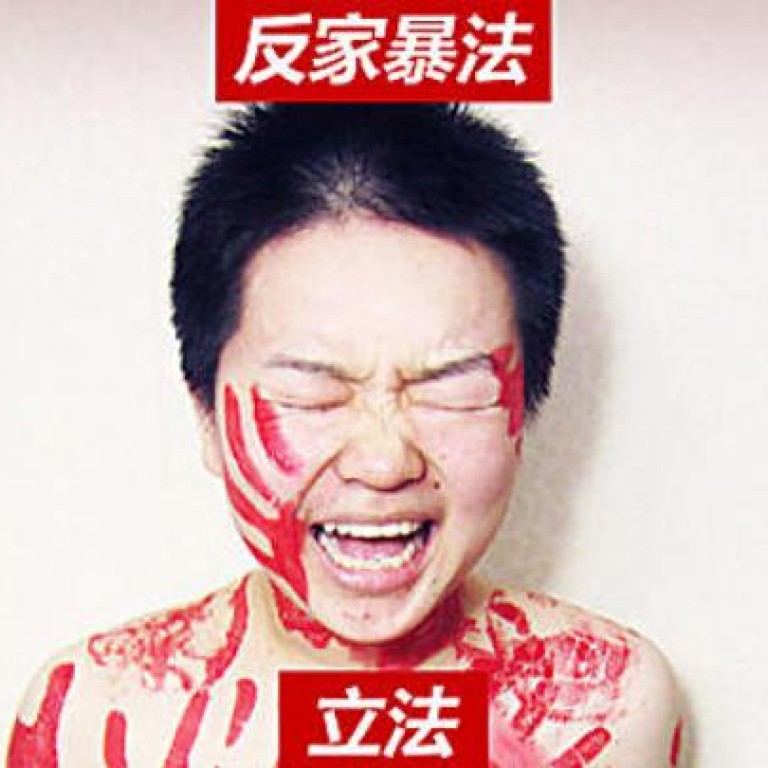
Chinese women post nude photos online to fight domestic violence
Women post provocative photos of themselves online to challenge people's prejudices and demand a law against violence in the home
Advocates for women's rights across China are publishing nude photos of themselves as part of a growing online movement pushing for the speedy enactment of an anti-domestic violence law.
They decided to take matters in their own hands rather than wait for the government to act.
Xiong Jing , a 24-year-old web editor with a graduate degree in gender studies, was one person taking part in the campaign. She signed an online petition, expected to garner 10,000 signatures, that would be sent to the National People's Congress to call for action. As part of the battle, she posted pictures of herself naked online to challenge misconceptions about what it means to be a victim.
"This is a very powerful image and something that smashes a taboo. I hope it gets people thinking about the relationship between domestic violence and the naked body," Xiong said.
"I like the saying that the body is a battlefield. I wanted to use this approach to show my support for women and raise awareness about violence against women."
The campaign, which started on November 6, has already collected over 5,000 signatures. Among the petition's demands are calls for more transparency in the legislative process to allow greater participation by ordinary people, a legal mechanism to ensure accountability, and funds for non-government organisations that help women.
Beijing has included the anti-domestic violence ordinance in its legislative agenda, but Feng Yuan , chairwoman of the China Anti-Domestic Violence Network, expected it would be another two to three years before the NPC enacted the law.
The decision to publish the nude photos was being made by women individually and not part of an orchestrated effort. Many of the women do not know each other and hail from different parts of the country, including Hong Kong, Shandong and Beijing.
"I'm very thrilled and encouraged to see that more and more women are posting nude photos of themselves no matter what their body shape or size," Xiong said.
Many of the photos show women with slogans written across their chests in red ink, which symbolises blood.
They read: "Proud to be flat-chested; shame on domestic violence", "Don't hurt her; love my body" and "Liberate gender, eliminate violence".
Like many of the women involved, Dian Dian, a 23-year-old graduate student in history at the Chinese University of Hong Kong, posted her picture because she believed it was the right thing to do.
"I was very self-conscious at first … but when I saw the first photo coming from a flat-chested girl, I felt she was very brave to stand up to criticism in a male-dominated society. I think that's really admirable," Dian said, adding that she then did not hesitate to post a picture of herself.
"The use of the body in language is powerful. Posing nude might seem irrelevant to the problem of domestic violence but our bodies are closely tied to the struggle.
"Domestic violence has long been regarded as a private matter [in traditional Chinese households]. The question of privacy is also relevant to women's bodies," she said.
Dian said people who could not see a photo of a nude woman for what it was should confront their prejudices.
Feng Yuan , chairwoman of the China Anti-Domestic Violence Network, said the nation was only beginning to realise the gravity of the issue and the reality was far more serious than the figures indicated.
"What these young women are doing is very courageous. They are expressing the idea that women themselves are in charge of their bodies," she said.
"The latest official figures show that roughly one in every four married women is subjected to domestic violence of some degree. But violence is not limited to married households. It also happens in families where gay daughters are subjected to rape, as per parents' arrangements."
When the movement first started, some of the pictures were deleted by weibo operator Sina but the censoring stopped after more women participated, said Lu Pin , programme manager for the Media Monitor for Women Network in Beijing.
"This serves as a good opportunity to question the politics of sexual equality," Lu added.

